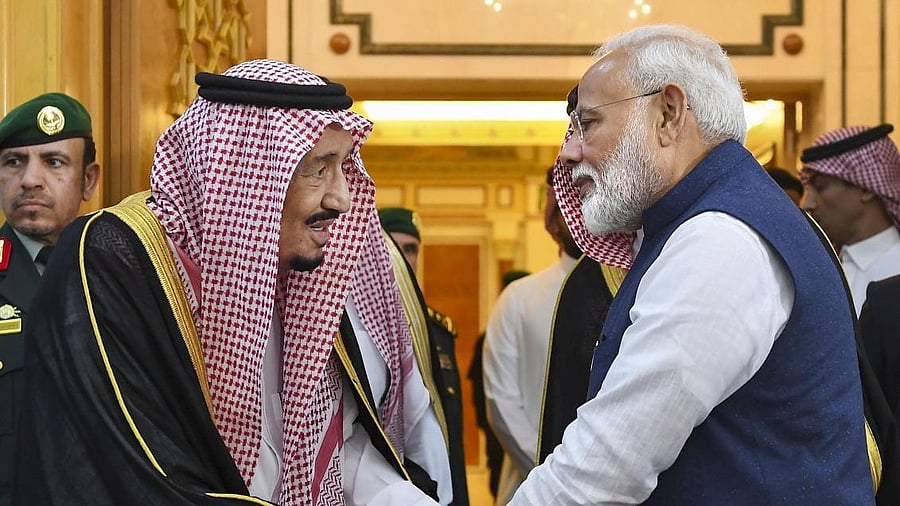
Prime Minister Narendra Modi meets H.M. King Salman bin Abdulaziz Al Saud in Riyadh, Saudi Arabia, Tuesday, Oct. 29, 2019.
Credit: PTI Photo
In the hours after the deadly attack on tourists in Pahalgam, in which 26 people were killed, India unsurprisingly received a flood of support from the global community. From United States President Donald Trump to his Russian counterpart, Vladimir Putin, leaders condemned the killings.
Standing out amid those comments were messages of empathy for India from a handful of countries that historically haven’t always stood in India’s corner: nations belonging to the Gulf Cooperation Council (GCC). Their firm criticism of the attack and willingness to publicly stand by India is a triumph of New Delhi’s diplomacy over the past two decades.
Yet unless India guards that success with care, it could lose the gains of recent years.
Nothing epitomises the shift in how Gulf nations view the subcontinent better than the fact that Prime Minister Narendra Modi was visiting Saudi Arabia when terrorists unloaded their AK-47s on helpless civilians in Pahalgam, marking the worst attack on tourists in 25 years.
Modi returned home early, by which time Saudi Arabia had publicly decried the killings.
Such a scenario would have been hard to envision in decades past. During both the 1965 and 1971 wars, Saudi Arabia backed Pakistan. India’s Cold War posture of non-alignment placed it at odds with Riyadh and Islamabad, both of which were US allies.
Tensions mounted when India supported the Soviet invasion of Afghanistan, which Saudi Arabia and Pakistan opposed by arming and financing the mujahideen. India’s traditionally strong ties with Iran and Egypt — historical rivals of Saudi Arabia for influence in West Asia — only complicated relations between New Delhi and Riyadh.
To be sure, millions of Indians lived and worked in Gulf countries. But led by Saudi Arabia, the region’s Arab nations were more closely aligned with Pakistan than with India.
It took careful recalibration, first under Prime Minister Manmohan Singh, to reset relations with the GCC. India’s offer was simple: It had a giant economy that was growing fast and could serve as a lucrative destination for investments from Arab nations. Under Modi, New Delhi has turbocharged its outreach to the Gulf, with repeated visits by the prime minister and a dramatic uptick in energy and security cooperation.
Gulf sovereign wealth funds are today major investors in India. And having bet on India, they need the country’s economy to succeed. That in turn means they need India to remain stable and secure — not under attack from terrorists.
Meanwhile, Gulf nations have themselves faced the threat of violent extremism in the form of the IS group, which united much of the region against it. The same Gulf nations that would once ignore India’s warnings against terrorism now listen to those cautionary alerts with care.
To be sure, that does not mean that these countries have turned against Pakistan, the country New Delhi holds principally responsible for not just the Pahalgam attack, but for decades of proxy war through support for armed militancy in Kashmir, and repeated terrorist strikes across India. Saudi Arabia and the United Arab Emirates remain major economic benefactors of Pakistan.
But today, India knows that if it retaliates against Pakistan — including militarily — that is unlikely to ravage its relations with Gulf nations.
It would be a mistake, however, for India to take that support from Gulf nations for granted.
In June 2022, the foreign office was confronted with a firestorm of anger and condemnation from India’s friends in the Gulf after Nupur Sharma, a spokesperson for the Bharatiya Janata Party (BJP), made insulting remarks about Prophet Muhammad. Years of carefully cultivated relationships could have gone up in smoke.
Modi and the BJP cut Sharma loose, apologised profusely, and just about managed to save the day.
Yet three years later, as an angry India grapples with the aftermath of the Pahalgam attack, the country — and the Modi government — would do well to recall the Nupur Sharma incident.
Across the nation, reports of attacks on Kashmiri students, harassment of Muslims, and Islamophobic hate speech are growing. That hate is, of course, consuming India, shredding its unity right when it needs it the most.
But it could also undermine the goodwill India currently enjoys from Gulf nations. New Delhi cannot afford such a self-goal.
Charu Sudan Kasturi is a senior journalist focusing on international relations, trade, energy, and technology. Twitter: @CharuKasturi.
Disclaimer: The views expressed here are the author's own. They do not necessarily reflect the views of DH.